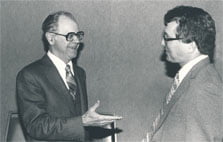The Peaceable Fruit of Biblical Ecumenism
In the Message to all Churches of Jesus Christ throughout the world, (See December 7) the First General Assembly of the Presbyterian Church in America (though it was called originally National Presbyterian Church) had specifically stated that they invited “into ecclesiastical fellowship all who maintain our principles of faith and order.” It was at the Fifth General Assembly of PCA, meeting in Smyrna, Georgia, that the Reformed Presbyterian Church, Evangelical Synod sent a communication requesting closer relationship and engagement of cooperative ministries.
 Two assemblies later in 1979, a small committee with a long name, namely, “The Ad Interim Committee to Discuss Areas of Agreements, Differences, and Difficulties with the Orthodox Presbyterian Church (OPC), the Reformed Presbyterian Church, Evangelical Synod (RPCES), and the Reformed Presbyterian Church of North America” was constituted by the Presbyterian Church in America (PCA). They would meet many times in the two years of discussion with representatives of the various Presbyterian churches.
Two assemblies later in 1979, a small committee with a long name, namely, “The Ad Interim Committee to Discuss Areas of Agreements, Differences, and Difficulties with the Orthodox Presbyterian Church (OPC), the Reformed Presbyterian Church, Evangelical Synod (RPCES), and the Reformed Presbyterian Church of North America” was constituted by the Presbyterian Church in America (PCA). They would meet many times in the two years of discussion with representatives of the various Presbyterian churches.
In June of 1980, at the Eighth General Assembly of the PCA, that body issued invitations to the aforementioned denominations to join the PCA. The invitation was not to be a long courtship but rather a quick “tying of the knot” by simply merging into the PCA by a common commitment to the subordinate standards of the Westminster Assembly and the Book of Church Order.
 The Reformed Presbyterian Church of North America, citing exclusive psalmody and other considerations, pulled out of the discussions. The invitation to the Orthodox Presbyterian Church come up to a vote of presbyteries in both bodies. It failed by a narrow margin to arrive at the necessary vote by both assemblies, first by the PCA and then by the OPC. Fraternal relations continue between both bodies with each other.
The Reformed Presbyterian Church of North America, citing exclusive psalmody and other considerations, pulled out of the discussions. The invitation to the Orthodox Presbyterian Church come up to a vote of presbyteries in both bodies. It failed by a narrow margin to arrive at the necessary vote by both assemblies, first by the PCA and then by the OPC. Fraternal relations continue between both bodies with each other.
For the remaining two denominations of the Presbyterian Church in America and the Reformed Presbyterian Church Evangelical Synod, joint General Assemblies were scheduled for their next national meetings at Calvin College, in Grand Rapids, Michigan. The pivotal vote of the RPCES on June 14, 1982 accepted the union by a majority vote of 322 – 90. Elected as moderator was former RPCES scholar and minister, Dr. R. Laird Harris, from Covenant Theological Seminary.
By this union, the PCA received 164 churches, 416 ministers, 20,615 communicant members, 6,139 covenant children, Covenant Theological Seminary, Covenant College, a direct line to the Scottish Covenanters from the Reformed Presbyterian Church branch of the former RPCES, and the God-given experience of recognized theologians, teaching and ruling elders in both churches.
The “marriage” has lasted now 30 years (as of 2012), with continued prayers and work to make it a lifetime of married bliss.
Words to Live By:
Here is true biblical ecumenism. We ought to unite together on the basis of the Word of God and the Westminster Standards with all churches which have that common basis. By it, the Church is strengthened to meet the secular challenges of the age in which we live; the divisive character of too many a religious body in the eyes of the watching world is removed, and God’s people are built up in the holy faith. Work where God has placed you to make this a reality more and more.
Through the Scriptures: Song of Solomon 1 – 4
Through the Standards: Ceremonial law abrogated
WCF 19:3
“Besides this law, commonly called moral, God was pleased to give to the people of Israel, as a church under age, ceremonial laws, containing several typical ordinances, partly of worship, prefiguring Christ, His graces, actions, sufferings, and benefits; and partly, holding forth divers instructions of moral duties. All which ceremonial laws are now abrogated, under the new testament.”
